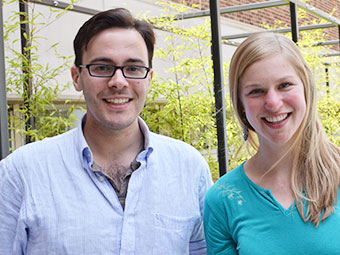
You've heard of mystery shopping, where market researchers snoop around to gather information on products or services. Well, two School of Public Health graduate students have been doing some secret shopping in the name of health care reform.
Paula Blasi and Ross Howell, first-year Master of Public Health students at the UW School of Public Health, made more than 760 phone calls to see if primary care providers in King County were accepting new Medicaid patients as advertised.
The mystery shopping was part of their MPH practicum within the School's Community-Oriented Public Health Practice program. They were supervised by Eli Kern (MPH, '13), an epidemiologist with Public Health-Seattle & King County (PHSKC) and a member of the SPH clinical faculty in Health Services. Blasi and Howell were following up on a baseline survey taken in December by a private firm hired by the agency. They made their phone calls in April and presented the results to Kern and others earlier this month (June 2).
The issue is important because Medicaid eligibility was expanded under the Affordable Care Act, with more than 87,000 new enrollees in King County – a 73 percent increase over seven months. PHSKC needs to know if the health care system has the capacity to handle all of the new enrollees, Blasi and Howell say. In Massachusetts, where Medicaid was expanded in 2006 under a health reform law, the students noted the percentage of internal medicine physicians accepting new Medicaid patients declined from 73 percent to 58 percent.
Blasi and Howell called a random sample of providers from the online directories of the five Medicaid managed care organizations serving the county. The students found that most of the listed phone numbers were inaccurate, and they had to make many calls before reaching an accurately listed provider accepting new patients. The percentage of accurate phone numbers in the online directories had dropped from 37 percent in December to 31 percent in April.
Otherwise, the results of their survey – four months after the Medicaid expansion took effect – were similar to the baseline survey results. Nearly half of the providers were accepting new patients, and the median wait time for an appointment was one week.
Public Health is sharing these results with Medicaid managed care organizations and with community health centers in King county. "In addition to serving to ground truth these findings, meeting with health plans and clinics provides a timely opportunity for increased collaboration between the public health and health care systems," Kern says. The agency is still investigating what it all actually means, since it doesn't know how often consumers use these online directories. Public Health hopes to continue monitoring the expansion with future surveys and will consider looking at wait times for specialty providers and dental care, according to Kern.
"This is an important thing to monitor," Blasi says. "I am really interested in the effects of the Affordable Care Act. It's a great goal to get more people covered. It'll be interesting to see how it affects access to care."
